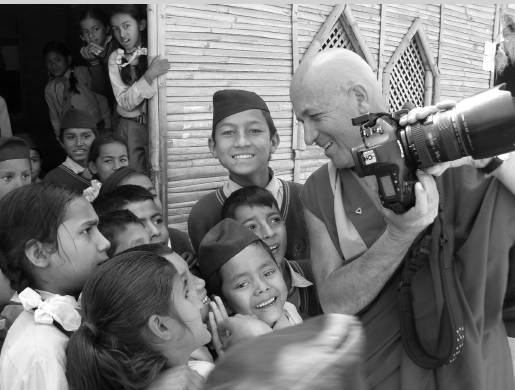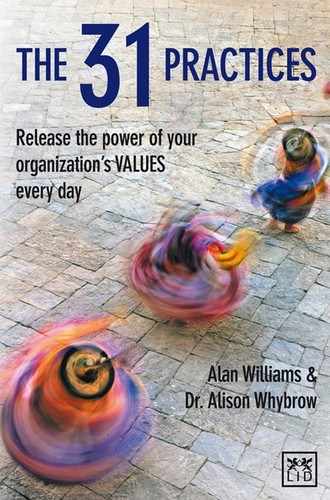31

CHAPTER 31 PHOTOGRAPHY
“Matthieu’s spiritual life and camera are one, and from this spring these images, fleeting yet eternal.”
Henri Cartier-Bresson1
When we were thinking about this book project, of course we wanted to create something that people wanted to read. We wanted the book to be of interest at a very practical level and also at a level that was thought provoking. But we also wanted the book to be more than that, to be special. Early on in the project, we had the idea of the structure of 31 chapters and decided to seek out a photographer whose work we could feature at the beginning of each chapter. We explored a number of possibilities and then (thanks to Google!) we discovered Matthieu Ricard. You will see from the below that, apart from his beautiful photographs, Matthieu is a perfect “fit”. We are honoured that he has chosen to support our book and, in turn, we are keen to support his Karuna-Shechen Foundation so please consider making a contribution.
Matthieu Ricard is a best-selling author, translator, photographer, and Buddhist monk highly regarded for his scholarship and knowledge of Buddhism and Tibetan culture. He has lived, studied, and worked in the Himalayan region for over 40 years.
The son of French philosopher Jean-François Revel and artist Yahne Le Toumelin, Matthieu was born in France in 1946 and grew up among the personalities and ideas of Paris’ intellectual and artistic circles. He earned a Ph.D. degree in cell genetics at the renowned Institute Pasteur under the Nobel Laureate Francois Jacob. In 1967, he travelled to India to meet great spiritual masters from Tibet.
After completing his doctoral thesis in 1972, he left his scientific career to concentrate on Buddhist contemplative practice. Since then, he has lived in India, Bhutan, and Nepal and studied with some of the greatest teachers of that tradition, Kangyur Rinpoche and Dilgo Khyentse Rinpoche.
He is the author of several best-selling books including The Monk and the Philosopher, a dialogue with his father; The Quantum and the Lotus, a dialogue with the astrophysicist Trinh Xuan Thuan; Happiness: A Guide to Developing Life’s Most Important Skill; and The Art of Meditation. His books have been translated into over 20 languages.
Matthieu’s intimate knowledge and unprecedented access to Tibetan teachers and culture has enabled him to capture on camera the spiritual masters, landscapes, and people of the Himalayas. He is the author and photographer of Journey to Enlightenment, Buddhist Himalayas, Monk Dancers of Tibet, Tibet: An Inner Journey, Motionless Journey, and Bhutan, Land of Serenity. His work has been exhibited throughout the world.
Henri Cartier-Bresson said of his photographs: “Matthieu’s camera and his spiritual life are one, and from this spring these images, fleeting yet eternal.”
Matthieu Ricard has dedicated his life to the study and practice of Buddhism following the teachings of the greatest Tibetan spiritual masters of our time. He has been the French interpreter for the Dalai Lama since 1989. He is the author of several volumes of Buddhist texts translated from the Tibetan, such as The Life of Shabkar: The Autobiography of a Tibetan Yogin, The Heart Treasure of the Enlightened Ones, and The Heart of Compassion: The Thirty-seven Verses on the Practice of a Bodhisattva (teachings by Dilgo Khyentse Rinpoche).
He is an active member of the Mind and Life Institute, an organization dedicated to collaborative research between scientists and Buddhist scholars and meditators. He is engaged in research on the effect of mind training and meditation on the brain at various universities in the USA and Europe.
In addition to receiving the French National Order of Merit for his humanitarian work, he has been the guest speaker at TED and many other conferences throughout North America and Europe, as well as guided seminars and talks on happiness, compassion and meditation. When he is not travelling, Matthieu resides at Shechen Monastery in Nepal.
Karuna-Shechen
In 2000, Matthieu Ricard founded Karuna-Shechen, a global non-profit humanitarian organization. Based on the ideal of “compassion in action”, Karuna-Shechen develops education, medical, and social projects for the most destitute populations of the Himalayan region. Under his guidance, the organization has initiated and managed over 120 humanitarian projects in India, Nepal, and Tibet. The photographs in this book are taken in areas where the projects are located.
Karuna-Shechen’s beneficiaries live in remote and isolated areas and have little or no other access to essential services. Over 90,000 beneficiaries have been helped. They range in age from young children to the elderly. Special attention is given to the education and empowerment of women. Services are offered on a sliding scale according to means and free of charge to the poorest patients. Karuna-Shechen’s activities have a significant direct impact on individuals, families, and communities. Its programmes are developed in direct response to their needs and aspirations by working directly in the field with local partners. Projects range from a large clinic in Nepal to small dispensaries in Tibet, from schools for 3,000 children to helping village grandmothers become solar engineers, and caring for the abandoned elderly to helping individual children in need.
Widespread poverty in India and Nepal makes access to even basic healthcare extremely difficult; in Tibet, remote regions do not have adequate medical facilities. Karuna-Shechen helps 16 medical clinics in eastern Tibet, operates a large medical clinic and dispensary in Nepal, and a mobile clinic and medical centre in India. Its outreach programmes include health education in schools and slum areas of Nepal, basic medical help to villages and the destitute in Bihar, India, and programmes in Tibet to help disaster victims. The majority of the patients are women and children.
Almost 50% of Karuna-Shechen’s resources are used for education with an emphasis on the education of girls who are often not given the opportunity to go to school. In Nepal, Karuna-Shechen builds bamboo schools to educate thousands of poor children. In India, it facilitates non-formal education to women in rural villages. In Tibet, it offers scholarships to students for higher education and builds and supports schools for Tibetan children.
Its social service programmes include support of the elderly, a hospice, vocational training, and help for disadvantaged individuals. Karuna-Shechen also supports a number of cultural preservation projects in Tibet.
All Matthieu Ricard’s proceeds from his books, photographs, and events are donated to Karuna-Shechen. Support also comes from individual donors and foundations and online contributions. For further information on these wonderful projects and to learn how you can participate, please go to www.karuna-shechen.org.
